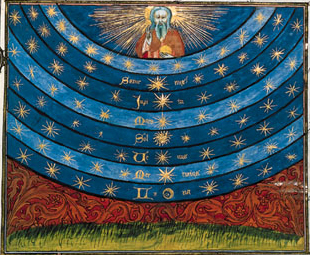The inaugural Shakespeare Follow-Up is dedicated to Rebecca.
As she can tell you, when Puck is first introduced in A Midsummer Night’s Dream, he meets a fairy who tells him:
I do wander every where,
Swifter than the moone’s sphere;
But what is the moon’s “sphere” and why should we believe it is particularly swift? To fully appreciate this line, and many like it across the canon, it’s important to know a little bit about how Shakespeare and his contemporaries viewed the cosmos.
In the Metaphysics, Aristotle described a system of concentric spheres, based on the works of pre-Socratic philosphers. Each observable planetary body, including the Moon, was embedded in one of these spheres. The spheres were made of transparent matter, in contact with one another, and able to rotate independently. (Positing a thin layer of WD-40 between spheres would have been beyond the technological capabilities of the ancient Greeks.) The Moon’s sphere was the closest to the Earth, and therefore, could move the fastest. This was followed by Mercury, Venus, the Sun, Mars, Jupiter, Saturn, and the sphere of the stars. Outside the spheres was the Prime Mover, which is the original source of all motion. God, if you like.
Claudius Ptolemy was an astronomer living in Alexandria in the 2nd century AD, while Egypt was part of the Roman Empire. Ptolemy noticed that some of the data, particularly retrograde motions of the planets, could not be explained by the existing model. He added the idea of epicycles, spheres rotating within spheres, which allowed for irregular movement of the planets, and the concept remained the dominant cosmological model for centuries.

Around the 12th century, Aristotelian concepts (including Ptolemaic cosmology) became intertwined with Christian theology. By the time Copernicus developed his heliocentric model in the early 16th century, it was not only a challenge to Aristotle and Ptolemy, but also to Church teachings that God put man in the center of the universe.
This is the world that Shakespeare and Galileo were born into in 1564. The theories of Copernicus were known, but not commonly accepted as true. It should be noted, however, that even Copernicus accepted the idea of celestial spheres; he just put the Sun in the center instead of the Earth. Shakespeare makes reference to the spheres all throughout his plays, often metonymously for the cosmos as it affects our fates, or simply as a shared cultural reference.
So the Bastard in King John can ask “Now, now, you stars, that move in your right spheres,/ Where be your powers?” as Demetrius in A Midsummer Night’s Dream observes “Yet you, the murderer, look as bright, as clear,/ As yonder Venus in her glimmering sphere.”
Fixed and unchangeable, the spheres also serve as a convenient metaphor for the rightfulness of hierarchies here on Earth. Shakespeare draws this comparison often, most notably in this speech from Ulysses in Troilus and Cressida:
The heavens themselves, the planets, and this centre
Observe degree, priority, and place,
Insisture, course, proportion, season, form,
Office, and custom, in all line of order:
And therefore is the glorious planet Sol
In noble eminence enthron’d and spher’d
Amidst the other; whose med’cinable eye
Corrects the ill aspects of planets evil,
And posts, like the commandment of a king,
Sans check, to good and bad: but when the planets
In evil mixture to disorder wander,
What plagues, and what portents, what mutiny,
What raging of the sea, shaking of earth.
Commotion in the winds, frights, changes, horrors,
Divert and crack, rend and deracinate
The unity and married calm of states
Quite from their fixure!
When we see the Sun referred to as “the glorious planet Sol,” it has the power to remind us just how much distance is between the scientific understanding of Shakespeare’s time and our own. And reading this in 21st century America, we also feel the gap in worldview as we see hierarchic culture defended so fiercely. Both celestial spheres and geocentrism will likewise fade in the century following Shakespeare’s death, but the ideas remain forever embedded in Shakespeare like the planets in their spheres. Thus, we understand that when, in 1 Henry IV, Hal tells Hotspur that “Two stars keep not their motion in one sphere,” it’s Elizabethan for “This town ain’t big enough for the both of us.”
Astronomers during Shakespeare’s lifetime, most notably Tycho Brahe and Johannes Kepler, already began using observational data to cast doubts about both geocentrism and the celestial spheres. The observation of comets was making the sphere model difficult to maintain. Galileo also took up the idea of heliocentrism and, after a long battle with the Church, was pressured into recanting. But the theories of Isaac Newton and the Scientific Revolution later in the 17th century gave heliocentrism a much stronger grounding in modern science which led to a wider acceptance as the culture became more open to the reexamination of our scientific understandings.
It wasn’t until the 20th century, however, that science learned that none of these models was the center of the universe, but rather one solar system among billions across a vast sprawling cosmos.
One can only wonder what Shakespeare might have done with such a revelation.
